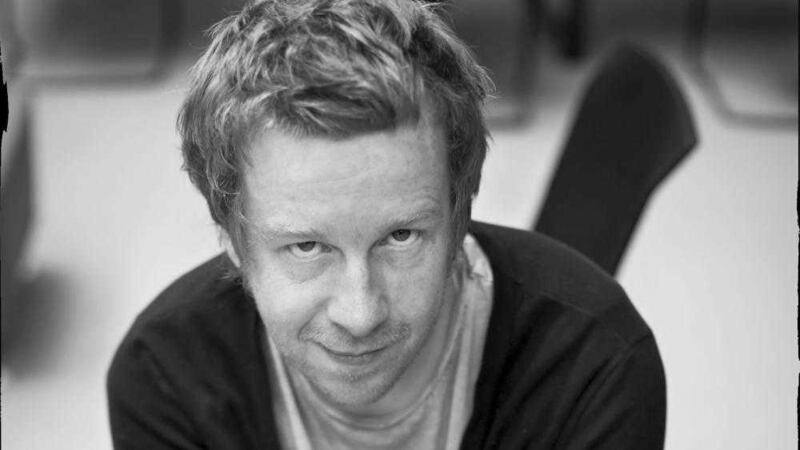LAST week Irish novelist Kevin Barry received the Goldsmiths Prize and pocketed the cheque for £10,000 that came with it. It's awarded annually to a novel that breaks the mould and extends the possibilities of fiction; Barry's second novel, Beatlebone, fits the citation like a biker's glove.
The book involves a kind of fantasy road trip with John Lennon who travels to Dorinish Island, a getaway he bought in1967 off the west of Ireland, and on the way the star confronts some demons and tries to work out his identity. It mixes Lennon facts with imagined encounters and characters and has been described as a "hatching hawk's egg in a Christmas cracker".
On receiving the prize in London, Barry said: "It's a really cool prize because it rewards innovation. And if the novel lacks innovation it's finished." (Only he didn't just say finished – Barry (46) uses swear words effectively in life as in his fiction.)
As the writer has instantly become super-busy, our interview was conducted by email, with answers beamed back from a plane taking him to New York.
The idea for the novel started when Barry – a keen cyclist who, having spent years travelling and living in places from California to Liverpool, has settled in in Sligo – spotted the location for Beatlebone off the west coast.
"It all began on my bike, when I was drifting around Co Mayo, looking down on all the tiny islands in Clew Bay, and wondering which one of them John Lennon used to own. I became a little obsessed with the story from there," he says.
That obsession with Lennon is what powers the novel. Barry even watched old Dick Cavett shows featuring John and Yoko to get the famous Scouser's tone of voice right.
Funnily enough, he wasn't always a Beatles fan. "I’ve never been a totally devoted Beatles fan, like many are, but I was always Church of John when it came to the band, and The White Album is definitely one of my favourite records."
In Beatlebone we first meet the burnt-out star in 1978 as he's heading for some sort of crisis. He's tried Primal Scream therapy in New York but now wants to head to his own island sanctuary for three days.
"That's all he asks, that he might scream his ****ing lungs out, that he might scream the days into nights and scream to the stars by night." Unfortunately, there are about 100 islands in Clew Bay and Lennon has no idea which is his. His driver, Cornelius O'Grady, an amiable but complicated creation, comes to the rescue.
"Cornelius has had many influences – he’s a charmer, sometimes, and sometimes darker, and always a little tricky, a little hard to read. There are certainly elements of myself in him," Barry says.
The storyline is compelling as Lennon and his guard flee the press and have to delay the journey to the island. There are surprises and the novelist himself pops up in the post-modern chapter entitled Eleven-Eleven-Dakota in which he writes about his research, snatching the reader out of the story. Why?
"The chapter is the emotional heart of the book. It’s a book about trying to create, about trying to make a record or a novel. And to do that, you have to go into your dark places and use what you find there."
We end up seeing Lennon caught between past, present and future. As Barry says: "In the novel, time is unfixed, John is obsessed with the future and what he's going to create but can't escape the past."
Limerick native Barry started out as a journalist, working for The Irish Examiner before turning freelance which he's said gets you out of the house. He began writing snippets of fiction, sometimes at 3am when he came back from a nightclub. ("Some of those pieces didn't stand up in the light of day.") The then fell in love with short stories.
"Novels and stories are very different beasts. You have very little room for manoeuvre in a short story; every sentence has to do its job. In a way, you’ll get away with more in a novel; it can be looser."
Certainly, Beatlebone, which he first wrote in a longhand 350,000-word version – the final cut is around 50,000 words – has been long haul.
A self-confessed optimist, he lives in a converted former RIC station with his wife. Asked the journalistic standard about how he relaxes, he says: "I cycle and I swim. I grow veggies; you never feel quite as smug as when you arrive into the kitchen with an armful of your own kale. I like pubs which are great for listening, naturally, for eavesdropping – in vino veritas, and all that."
Like his compatriot Roddy Doyle, who also finds pubs great material, he rates humour. "All of my favourite books, and favourite writers, have an amount of funny in them. I hate the critical response that equates seriousness with quality – that kind of if-it’s-funny-it-can’t-be-serious thing, which I think is tosh."
:: Kevin Barry will read from his novel Beatlebone in Waterstone's, 44 Fountain Street, Belfast, on Thursday November 26 at 6.30pm, with Q&A afterwards. (Admission free; more info on Belfast Waterstone's Facebook page or call 028 90240159). Beatlebone is published by Canongate.








